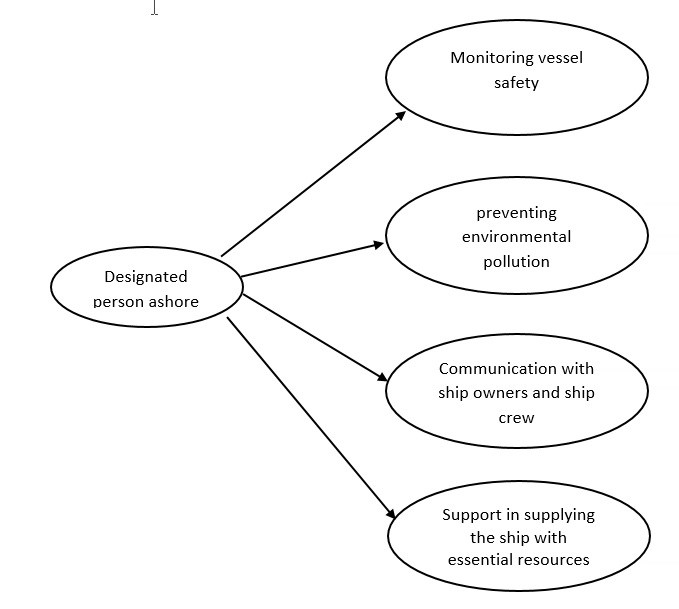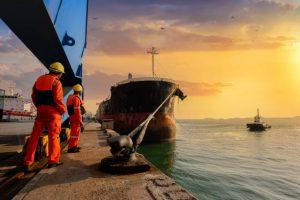Who is a Designated Person Ashore (DPA)?
The Designated Person Ashore is the person who acts as a link between the ship’s crew and the ship-owning company. Simply put, shipowners want to be sure that their ship is in good condition and that there are no problems with it, and if something urgent happens to the ship, they want to know about it.
However, the shipowners do not want to interact directly with the crew of their ship, which is why the Designated Person Ashore exists. This person conveys both emergency and routine information from the ship’s crew to the shipowners and in the reverse direction, making them, one could say, the central figure in this chain.
Disclaimer: The content and diagrams provided by www.novikontas.org are for informational purposes only.
The diagram (Figure 1.1) illustrates this process.

The Importance of DPA in Maritime Operations
The importance of the DPA lies in the fact that they are responsible for monitoring the safety of the vessel and preventing environmental pollution by the ship. The DPA is also responsible for the correct transmission of information from the ship’s crew to the shipowners and vice versa.
Lastly, the Designated Person Ashore monitors whether resources onboard the ship were used adequately. For this purpose, an annual audit of the vessel must be conducted, and the DPA should provide shore-based assistance to the ship as necessary. For example, delivering essential supplies to the vessel, food, and much more. The diagram (Figure 1.2) illustrates this process.

Salary for a Designated Person Ashore (DPA)
When choosing a job and future prospects, one of the first things that everyone is interested in is the salary. The salary information used in the tables below was obtained from https://www.glassdoor.co.uk/ and https://www.comparably.com/.
The following tables present the average salary in the United Kingdom and the United States.

What Education Do You Need to Become a DPA?
To qualify for the position of Designated Person Ashore, you need to go through a 3-step process:
1. A bachelor’s degree in maritime studies — 3 years.
2. Experience working on a ship — at least 3 years.
3. Specialized courses for Designated Person Ashore.
This path must be followed in the exact sequence as shown in Diagram 1.3.

This is the path you need to take to become a Designated Person Ashore, but don’t think that you will be struggling financially throughout this journey. Usually, while studying for your maritime bachelor’s degree, you also undergo practical training as a cadet and earn around $800 per month.
During the 3 years of study, you will spend between 12 and 16 months in practice, and this money will be enough for basic living expenses.
As soon as you finish your 3-year education, you will go to sea as a Deck Officer, where the salary is already twice as much. Over the next 3 years or more, you will rise in rank and earn very good money compared to the average salary.
1. Maritime Bachelor degree:
This education can be obtained at any certified maritime university or college. Be cautious and check whether the university has a certified bachelor’s program.
2. Experience working on a ship:
Usually, maritime colleges and universities help good students secure their first maritime contracts and initial job ideas. If you prove yourself as a hardworking and capable individual, the work will find you, as there is a shortage of people at sea.
3. Specialized courses for Designated Person Ashore:
After you decide to leave the sea for some reason and you have the necessary experience, education, and knowledge of maritime laws, you need to take specialized online courses for Designated Person Ashore. These courses will give you a basic understanding of the position, and then you can submit your CV to shipping companies.
Advantages of Working as a DPA in the Maritime Industry:

Becoming a Designated Person Ashore is only possible after gaining a certain amount of experience at sea. You need to spend at least 5 years or more at sea before you have the opportunity to become a DPA. The main advantages of this profession are:
1. You work onshore, meaning you are always close to your loved ones.
2. The workweek consists of 5 days.
3. You build connections with the bosses of ship-owning companies, which may provide opportunities for future career plans and advancement.
People usually leave the sea because, first of all, you spend a long period of time in a confined space, which can lead to the feeling that you cannot have time alone. Also, the lack of active participation in the lives of your loved ones is a significant psychological stress, as for long periods of time, you simply do not participate in your family’s life. Active participation requires physical presence.
These are the most common reasons for leaving the sea. Of course, this doesn’t happen to everyone, but for some seafarers, these thoughts often arise, and that’s why the profession of Designated Person Ashore suits them, as it allows them to stay in the maritime industry—so the accumulated knowledge and experience are still useful—and the salary will be above average.
Author Profile

- Passionate content creator, contributor, freelance writer and content marketing allrounder.
Latest entries
 ed techJune 4, 2025Children and AI: Empowering Young Minds or Setting Boundaries?
ed techJune 4, 2025Children and AI: Empowering Young Minds or Setting Boundaries? careerApril 21, 2025The Importance of an Effective Apostille Translation for Official International Certificates
careerApril 21, 2025The Importance of an Effective Apostille Translation for Official International Certificates careerMarch 13, 2025How can Students enter the very lucrative and growing iGaming Industry?
careerMarch 13, 2025How can Students enter the very lucrative and growing iGaming Industry? learningJanuary 23, 2025Top 5 Practical Articulation Skills for Creating Better eLearning Experiences
learningJanuary 23, 2025Top 5 Practical Articulation Skills for Creating Better eLearning Experiences







